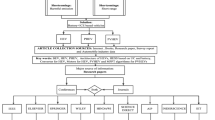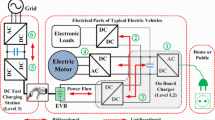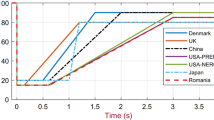Abstract
During the last decade, the equivalent consumption minimization strategy (ECMS) and the Pontryagin’s Minimum Principle (PMP)-based optimal control strategy have been developed for power management of hybrid vehicles, and it has been noticed that there are some similarities between the two strategies. Establishing their exact relationship and distinguishing their fundamental differences have become necessary for further development in the field of power management strategy. The two strategies are numerically compared and their relationship is established in this research. The two strategies are applied to a fuel cell hybrid vehicle (FCHV) in a computer simulation environment and the simulation results of the two strategies are also compared. It is concluded that the numerical comparison result depends on the open-circuit-voltage (OCV) of the battery model. As a result, the ECMS and the PMP-based optimal control strategy can numerically have the same solutions for non-plug-in hybrid vehicles by adjusting two parameters. Differences between the two strategies are also discussed and the superiority of the PMP-based optimal control strategy is emphasized.
Similar content being viewed by others
References
Bernard, J., Delprat, S., Buechi, F. and Guerra, T. M. (2006). Global optimization in the power management of a fuel cell hybrid vehicle (FCHV). Proc. IEEE Veh. Power Propuls. Conf., 1–6.
Bernard, J., Delprat, S., Buechi, F. and Guerra, T. M. (2009). Fuel-cell hybrid powertrain: Toward minimization of hydrogen consumption. IEEE Trans. Veh. Technol., 58, 3168–3176.
Bernard, J., Delprat, S., Guerra, T. M. and Buechi, F. (2010). Fuel efficient power management strategy for fuel cell hybrid powertrains. Control Eng. Pract., 18, 408–417.
Chasse, A. and Sciarretta, A. (2011). Supervisory control of hybrid powertrains: An experimental benchmark of offline optimization and online energy management. Control Eng. Pract., 19, 1253–1265.
Ehsani, M., Gao, Y. M. and Emadi, A. (2010). Modern Electric, Hybrid Electric, and Fuel Cell Vehicles. 2nd edn. CRC Press. Boca Raton. 459–469.
Kim, M. J. and Peng, H. (2007). Power management and design optimization of fuel cell/battery hybrid vehicles. J. Power Sources, 165, 819–832.
Kim, N. W. (2009). Energy Management Strategy for Hybrid Electric Vehicles Based on Pontryagin’s Minimum Principle. Ph. D. Dissertation. Seoul National University. Seoul. Korea.
Kim, N. W. and Rousseau, A. (2012). Sufficient conditions of optimal control based on Pontryagin’s minimum principle for use in hybrid electric vehicles. Proc. Inst. Mech. Eng. Part D-J. Automob. Eng., 226, 1160–1170.
Kim, N. W., Cha, S. W. and Peng, H. (2011). Optimal control of hybrid electric vehicles based on Pontryagin’s minimum principle. IEEE Trans. Control Syst. Technol., 19, 1279–1287.
Kirk, D. E. (1970). Optimal Control Theory. Prentice-hall. New York. 184–209.
Low, W. Y., Aziz, J. A., Idris, N. R. N. and Saidur, R. (2013). Electrical model to predict curren-voltage behaviours of lithium ferro phosphate batteries using a transient response correction method. J. Power Sources, 221, 201–209.
Musardo, C. and Rizzoni, G. (2005). A-ECMS: An adaptive algorithm for hybrid electric vehicle energy management. 44th IEEE Conf. Decision and Control, and the European Control Conf.
Paganelli, G., Delprat, S., Guerra, T. M., Rimaux, J. and Santin, J. J. (2002). Equivalent consumption minimization strategy for parallel hybrid powertrains. Vehicular Technology Conf., 2076–2081.
Paganelli, G., Tateno, M., Brahma, A., Rizzoni, G. and Guezennec, Y. (2001). Control development for a hybridelectric sport-utility vehicle: Strategy, implementation and field test results. American Control Conf., 5064–5069.
Pisu, P. and Rizzoni, G. (2007). A comparative study of supervisory control strategies for hybrid electric vehicles. IEEE Trans. Control Syst. Technol., 15, 506–518.
Pukrushpan, J. T., Peng, H. and Stefanopoulou, A. G. (2004). Control-oriented modeling and analysis for automotive fuel cell systems. Trans. ASME, 126, 14–25.
Roscher, M. and Sauer, D. (2011). Dynamic electric behavior and open-circuit-voltage modeling of LiFePO4-based lithium ion secondary batteries. J. Power Sources, 196, 331–336.
Rousseau, G., Sinoquet, D. and Rouchon, P. (2007). Constrained optimization of energy management for a mild-hybrid vehicle. Oil Gas Sci. Technol., 62, 623–634.
Sciarretta, A. and Guzzella, L. (2007). Control of hybrid electric vehicles. IEEE Control System Magazine, 60–70.
Sciarretta, A., Back, M. and Guzzella, L. (2004). Optimal control of parallel hybrid electric vehicles. IEEE Trans. Control Syst. Technol., 12, 352–363.
Serrao, L., Onori, S. and Rizzoni, G. (2009). ECMS as a realization of Pontryagin’s minimum principle for HEV control. American Control Conf., 3964–3969.
Serro, L. and Rizzoni, G. (2008). Optimal control of power split for a hybrid electric refuse vehicle. American Control Conf., 4498–4503.
Thele, M., Bohlen, O., Sauer, D. and Karden, E. (2008). Development of a voltage-behavior model for NiMH batteries using an impedance-based modeling concept. J. Power Sources, 175, 635–643.
Vahidi, A., Stefanopoulou, A. G. and Peng, H. (2006). Current management in a hybrid fuel cell power system: A model-predictive control approach. IEEE Trans. Control Syst. Technol., 14, 1047–1057.
Xu, L. F., Li, J. Q., Hua, J. F., Li, X. J. and Ouyang, M. G. (2009). Optimal vehicle control strategy of a fuel cell/battery hybrid city bus. Int. J. Hydrogen Energy, 34, 7323–7333.
Zheng, C. H., Kim, N. W. and Cha, S. W. (2012). Optimal control in the power management of fuel cell hybrid vehicles. Int. J. Hydrogen Energy, 37, 655–663.
Zheng, C. H., Oh, C. E., Park, Y. I. and Cha, S. W. (2012). Fuel economy evaluation of fuel cell hybrid vehicls based on equivalent fuel consumption. Int. J. Hydrogen Energy, 37, 1790–1796.
Author information
Authors and Affiliations
Corresponding author
Rights and permissions
About this article
Cite this article
Zheng, C.H., Xu, G.Q., Cha, S.W. et al. Numerical comparison of ECMS and PMP-based optimal control strategy in hybrid vehicles. Int.J Automot. Technol. 15, 1189–1196 (2014). https://doi.org/10.1007/s12239-014-0124-5
Received:
Revised:
Accepted:
Published:
Issue Date:
DOI: https://doi.org/10.1007/s12239-014-0124-5




